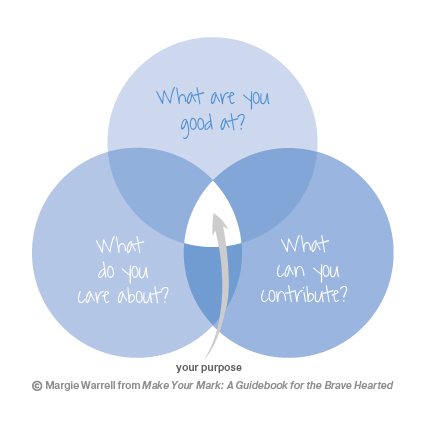If you’re reading this, chances are you’re someone who wants to do well in your work and be paid well for it. But you also want more than that. You want to feel that it serves some purpose greater than a paycheck or a position.
Albert Einstein said, “Ever more today people have the means to live, but not the meaning to live for.” That has only become truer over time. Research now confirms what many have long known: Only when our purpose for going to work transcends what we get from it to what we give through it, can we enjoy a deep sense of personal or professional fulfillment.
Having a sense of purpose in your work acts a little like the energy of light. Diffused, it has minimal strength. Concentrated, as through a laser beam, it can slice through steel. The clearer you are about the highest purpose in your life—your big why—the better you can channel your talents and time to make a meaningful mark on the world that leaves everyone, not just yourself, better off.
Recent studies have found that in our superficial selfie-obsessed world, having a deep sense of purpose is an increasingly strong predictor of happiness and a powerful antidote to depression. Research has found that purpose-driven people:
- Are 4x more likely to enjoy their work
- Are 50% more likely to be a leader
- Are higher income earners
- Enjoy 42% more general contentment
- Live up to 7 years longer
Unlike animals, who are wired only for survival, we humans crave more from life than mere existence. Without a compelling answer to the question, “Survival for the sake of what?”, we struggle to stay motivated, much less willing to step through our fear of failure toward whatever possibilities tug most at our hearts. When our highest purpose is the elevation of our comfort, status and security, it keeps us living in the shallows, unwilling to take the risks needed to discover, to disrupt, to create or to experience soul-level success.
If you sometimes struggle with a lack of meaning in your work, or if what once gave you purpose no longer does, you’re in the company of millions. Despair not, though. [inlinetweet prefix=”” tweeter=”” suffix=””]Our purpose tends to unfold and evolve as we do.[/inlinetweet] Sometimes we have to sit in the wondering, open to discovering what lies beyond the obvious or what has been staring us in the face the whole time. To help you along the process, I invite you to get out a pen and blank sheet of paper, draw a simple three-circle Venn diagram, and in each circle write down whatever comes to mind as you read the following three steps. Experience has taught me that our purpose lies where they intersect and will reveal itself when we’re ready to step into it.
1. Identify your strengths.
No need to be humble here; you’re good at many things. But there are some things you’re particularly good at. So much so that you sometimes wonder why on earth others find it so hard. Maybe it’s your quick read of people or balance sheets. Perhaps you’re brilliant in the details, a born entrepreneur, gifted communicator or tech maestro.
[inlinetweet prefix=”” tweeter=”” suffix=””]Our greatest strengths often flow from our toughest times.[/inlinetweet] So include here the hard-won wisdom, insights and skills you’ve learned from the school of hard knocks that no classroom could ever teach.
2. Clarify what you care about deeply.
“Live your passion!” says Tony Robbins. All well and good if you know what that is. But what if you don’t? Despair not. You don’t have to be on fire about helping at-risk kids, designing the Tesla, solving the world’s energy problems or mediating peace in the Middle East to live a deeply meaningful life. (Though if you are, go right ahead!) Since our emotions, not our knowledge, are the primary driver of action, you simply have to care enough about something that it triggers an emotional response in you—from what lights you up and puts you in flow to what makes you so barking mad you could be unstoppable in making things right.
So if the idea of pursuing your passion alienates you, start with writing down what you care about. Begin with the people and causes closest to your heart. From there move on to whatever ignites a spark in you: creative expression, sadness, anger, compassion, curiosity or an exciting sense of wild possibility. Every great feat of human accomplishment can be traced back to someone who cared deeply.
3. Discern where you contribute the greatest value.
Physician Albert Schweitzer once said, “One thing I know: The only ones among you who will be really happy are those who will have sought and found how to serve.” We humans are wired to look for good in the eyes of others, but only when we shift our focus to doing good can we truly thrive most ourselves.
Write down your answers to these questions:
- What problems are you great at solving?
- What wants and needs do people have that you’re able to meet?
- Which people are you best positioned to help?
- What stress, struggle or suffering are you able to ease for others?
- Where do you continually find yourself adding the most value?

Of course, unless you are financially independent, you’ll also need to establish not just the value you add, but who will pay for it. As I write in Make Your Mark, “While living with purpose requires focusing on what infuses the greatest meaning into your life, following the money and following your heart don’t have to be mutually exclusive.” It’s hard to live your purpose if you’re broke and hungry.
Sure, it’s gratifying to gain status, win applause and make a name for yourself. But committing to a purpose more important than stroking your ego or avoiding being bruised enables you to dig deep, find your courage and forge a truly good life.
As you finish this article, your purpose might remain unclear. Give yourself permission to live in the questions. Where is pride holding me back? What is the mark I most want to make? Where is my life calling me to be braver? You’ll eventually live into the answers. Regardless of how uncertain your path ahead, trust that you are here to make a mark that no one else can and that fulfilling your purpose begins simply by asking yourself this four-word question: How may I serve? And then taking a brave step in whatever direction your answer beckons.






